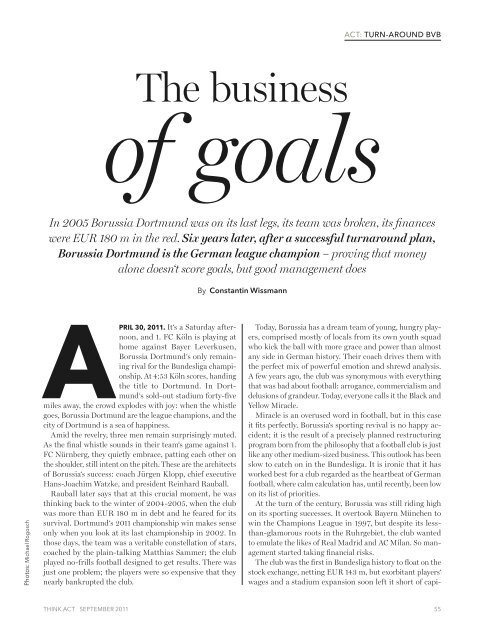Create successful ePaper yourself
Turn your PDF publications into a flip-book with our unique Google optimized e-Paper software.
Photos: Michael Rogosch<br />
The business<br />
of goals<br />
APRIL 30, 2011. It‘s a Saturday afternoon,<br />
and 1. FC Köln is playing at<br />
home against Bayer Leverkusen,<br />
Borussia Dortmund‘s only remaining<br />
rival for the Bundesliga championship.<br />
At 4:53 Köln scores, handing<br />
the title to Dortmund. In Dortmund‘s<br />
sold-out stadium forty-five<br />
miles away, the crowd explodes with joy: when the whistle<br />
goes, Borussia Dortmund are the league champions, and the<br />
city of Dortmund is a sea of happiness.<br />
Amid the revelry, three men remain surprisingly muted.<br />
As the final whistle sounds in their team‘s game against 1.<br />
FC Nürnberg, they quietly embrace, patting each other on<br />
the shoulder, still intent on the pitch. These are the architects<br />
of Borussia‘s success: coach Jürgen Klopp, chief executive<br />
Hans-Joachim Watzke, and president Reinhard Rauball.<br />
Rauball later says that at this crucial moment, he was<br />
thinking back to the winter of 2004-2005, when the club<br />
was more than EUR 180 m in debt and he feared for its<br />
survival. Dortmund‘s 2011 championship win makes sense<br />
only when you look at its last championship in 2002. In<br />
those days, the team was a veritable constellation of stars,<br />
coached by the plain-talking Matthias Sammer; the club<br />
played no-frills football designed to get results. There was<br />
just one problem; the players were so expensive that they<br />
nearly bankrupted the club.<br />
By Constantin Wissmann<br />
<strong>ACT</strong>: TURN-AROUND BVB<br />
In 2005 Borussia Dortmund was on its last legs, its team was broken, its finances<br />
were EUR 180 m in the red. Six years later, after a successful turnaround plan,<br />
Borussia Dortmund is the German league champion – proving that money<br />
alone doesn‘t score goals, but good management does<br />
Today, Borussia has a dream team of young, hungry players,<br />
comprised mostly of locals from its own youth squad<br />
who kick the ball with more grace and power than almost<br />
any side in German history. Their coach drives them with<br />
the perfect mix of powerful emotion and shrewd analysis.<br />
A few years ago, the club was synonymous with everything<br />
that was bad about football: arrogance, commercialism and<br />
delusions of grandeur. Today, everyone calls it the Black and<br />
Yellow Miracle.<br />
Miracle is an overused word in football, but in this case<br />
it fits perfectly. Borussia‘s sporting revival is no happy accident;<br />
it is the result of a precisely planned restructuring<br />
program born from the philosophy that a football club is just<br />
like any other medium-sized business. This outlook has been<br />
slow to catch on in the Bundesliga. It is ironic that it has<br />
worked best for a club regarded as the heartbeat of German<br />
football, where calm calculation has, until recently, been low<br />
on its list of priorities.<br />
At the turn of the century, Borussia was still riding high<br />
on its sporting successes. It overtook Bayern München to<br />
win the Champions League in 1997, but despite its lessthan-glamorous<br />
roots in the Ruhrgebiet, the club wanted<br />
to emulate the likes of Real Madrid and AC Milan. So management<br />
started taking financial risks.<br />
The club was the first in Bundesliga history to float on the<br />
stock exchange, netting EUR 143 m, but exorbitant players‘<br />
wages and a stadium expansion soon left it short of capi-<br />
<strong>THINK</strong> <strong>ACT</strong> SEPTEMBER 2011 55


